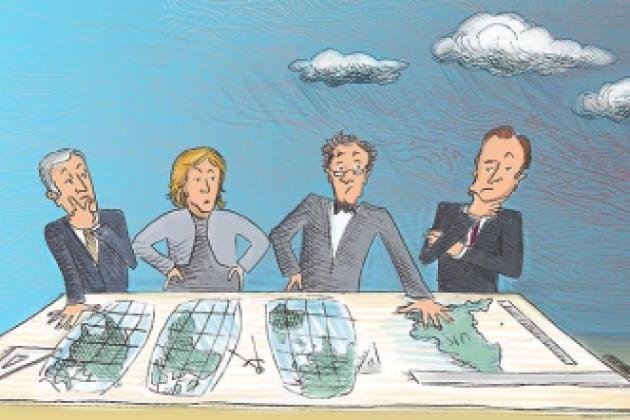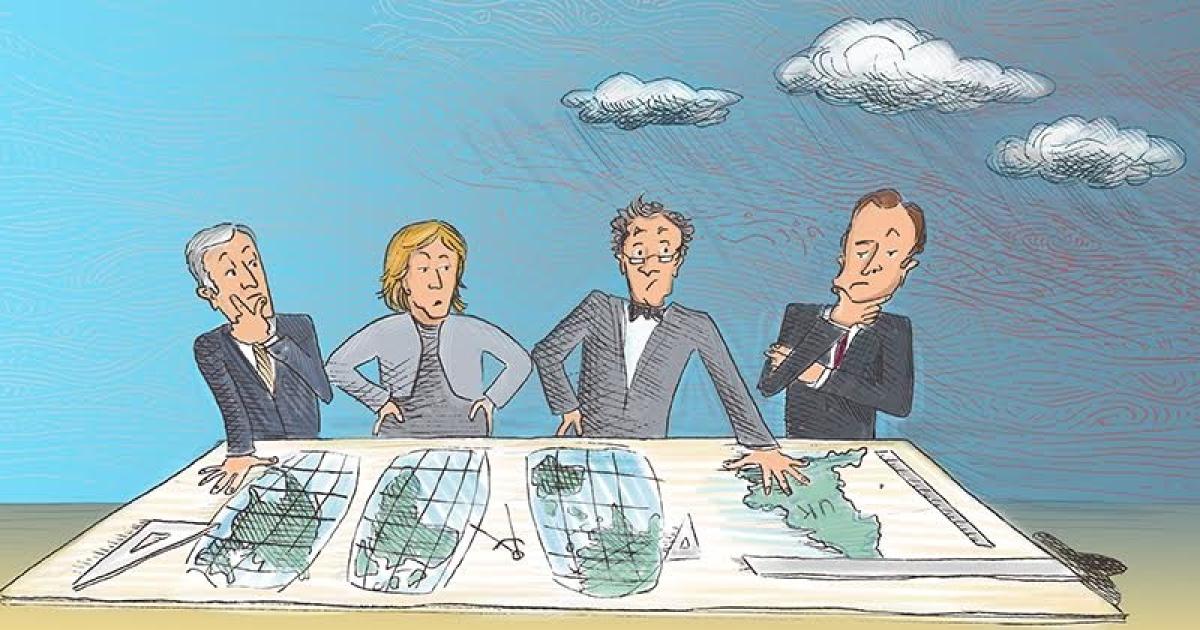One year after the Brexit vote, the future of the celebrated Special Relationship between the United States and the United Kingdom is still unclear. That relationship, said former President Obama after Britain voted to leave the EU, is enduring. However, this need to reassure the UK suggests that significant currents of US opinion believe otherwise. It rang hollow, a diplomatic nicety, similar to telling a friend with a serious injury: ‘I’m sure you will be fine.’ A closer look at the potential diplomatic, military, and economic consequences of Brexit suggests that US-UK relations may change, and not for the better.
This essay is written from an American perspective, highlighting the big-picture factors that Washington policymakers may consider as they rethink the Special Relationship. As the Leave vote was framed as the UK looking out for #1, no one should be surprised if America evaluates Brexit through a similar lens. The British might discover that what they most value about Leave, such as their sovereignty, has little meaning to America if it harms our strategic partnerships.
One caveat is that Brexit could take various forms. While Prime Minister Theresa May said that “Brexit means Brexit,” the final version could be “hard” or “soft” or something in between. How this plays out will shape the Special Relationship; the harder the Brexit, the greater the implications for the relationship.
We also do not fully know the policies of the Trump administration toward Britain and Europe. Some think Trump could save Brexit, while others believe Britain may end up “stranded between estranged allies” or that the more general “risks of a Trump presidency—protectionism, geopolitical turmoil, American isolationism—weigh heavy on British interests.” More ominously, Trump could be a “disaster” for Britain. When Theresa May visited the White House, Trump responded to a BBC journalist’s difficult question by joking “There goes that relationship!” If relations with America prove to “sting,” Brexit will be no laughing matter for the UK. Making America Great Again may not involve Saving Britain From Itself.
Is the UK a Reliable Ally?
Imagine you had a friend who said he was about to undertake a risky activity (Brexit) in the pursuit of a vague goal (sovereignty) and with possibly nefarious motives (nativism). According to the people who know him best, this action has a chance of harming him in very practical ways, and you yourself may experience collateral damage. But even if all the “experts” he dismisses—friends, family, his doctor, lawyer, and accountant—turn out to have been correct, he still wants to be your best friend: “We’re still cool, right?”
Well, maybe not. You might reasonably ask whether such a person should be trusted in the future; perhaps the situation calls for distance and caution. Former Prime Minister David Cameron promised an unnecessary vote on a topic parliament did not support in response to divisions within his party and competition from a third party. A number of prominent politicians, including some in his cabinet, opposed him or did not vigorously support him—perhaps out of principle, but possibly as a way to move into 10 Downing Street. David Cameron, leading the charge against Brexit, may have privately supported it. Boris Johnson, a prominent advocate of Brexit, may have privately opposed it. Labour Party leader Jeremy Corbyn, ostensibly against Brexit, may have privately supported it.
More generally, there was little apparent thought about whether a referendum was the right way to decide such a complicated question, and no voter turnout or vote thresholds were specified. The government decided not to engage in Brexit contingency planning, and Leave campaigners were victorious but had no clear plan for the future. The UK government has relatively weak internal capacity to negotiate with an EU that is chock full of bureaucrats who live to fashion complex, difficult deals. A political class capable of this “dog’s dinner” might be capable of other unpredictable gambles.
Let’s not forget that the Brexit campaign featured the dismissal of expert opinion. A substantial portion of Leave leaders and voters willfully ignored the nation’s business, academic, banking, and national security experts. Politics is politics, of course, and experts are unpopular in many places (including the US), but Leavers made anti-expert sentiment a part of the campaign. What other informed opinions might British politicians and voters ignore?
The UK May No Longer be the UK
Post-Brexit, the independence of Scotland and the future of the union is once more an issue. The 2014 referendum was worded “Should Scotland be an independent country?” and received 55.3% No and 44.7% Yes. This was a stronger No victory than the polls anticipated, as many voters ultimately stuck with the devil they knew rather than the one they did not.
The Brexit vote changed the dynamics in Scotland. Most leaders in Scotland and England had previously accepted that a second referendum would not take place in the foreseeable future. Now, Scottish voters have to weigh the risks of leaving the UK against the risks of leaving the EU. The Scottish nationalists have been granted an unexpected gift, and Westminster will find it more difficult to ultimately deny a new referendum to Scotland.
Some observers believe the losses of the Scottish National Party (SNP) in the recent British parliamentary elections will move the issue to the back burner. However, such passions could easily reignite, especially if a “hard” Brexit prevails. Recall that it took two unsuccessful independence referenda in Quebec to (mostly) settle that issue.
Scotland may not be the only part of the UK to exit. It is conceivable, although less so, that Northern Ireland could join the Republic of Ireland. Long a dream of Irish nationalists, a NIXIT vote could attract support from both Catholics and Protestants who want to remain part of the EU. Others worry about the future of the peace accords if barriers, physical and otherwise, between Northern Ireland and the Republic are reinstated. People in both Irelands could choose to erase such divisions through unification. As with Scottish independence, the “harder” the Brexit, the greater the likelihood.
The UK May Have No Nuclear Weapons
A breakup of the UK would have crucial implications for British defense policy. HM Naval Base Clyde, situated in the west coast of Scotland, is the home port for British nuclear-armed submarines and the future base for the entire submarine fleet. Other base options appear problematic for a variety of financial, safety, and political reasons. Scotland is opposed to nuclear weapons and may not allow them to remain post-independence. The base was a significant, albeit unresolved, issue of contention during the 2014 Scottish referendum.
This is an awkward time for the UK to lose these bases, as Parliament voted last summer to start replacing the aging Trident submarine fleet. Without Scottish bases, there may be no point, and the new submarines could end up homeless. Perhaps they could be home ported in the United States, but what would that mean for UK “sovereignty”?
The UK May Have (Even) Fewer Conventional Military Capabilities
Defense spending was already a thorn in side of U.S. relations with NATO countries. The United States wants them to commit at least 2% of their GDP to defense, not unreasonably arguing that they should bear a more proportionate share of their own security. Whether or not President Trump handed Chancellor Merkel a $300 billion NATO invoice, this is an issue that is likely to remain on the US-UK-Europe policy agenda.
Britain has committed to this percentage for the immediate future, but it reportedly involved a variety of accounting gimmicks, such as adding peacekeeping operations and the cost of military and Ministry of Defense civilian pensions toward the total. If Brexit weakens the UK economy, the amount of money dedicated to defense may decline.
This would follow decades of reductions in British military capabilities, infrastructure, and industries, which is frequently noted in defense commentary. With so many historic regiments amalgamated and disbanded, not to mention declines in naval personnel and vessels, the actual force that Britain can contribute to sustained conventional operations is already low.
In addition, the potential departure of Scotland and Northern Ireland could further shrink the UK military. When the Republic of Ireland became independent in 1922, six regiments that traditionally recruited from that territory were disbanded. In a post-breakup future, the Royal Regiment of Scotland might be transferred to an independent Scotland, and the Royal Irish Regiment might be either transferred to a united Republic of Ireland or (more likely) disbanded. The status of the Scots and Irish Guards would be unclear, given their unique association with the Sovereign.
The UK Will Play a Reduced Role in Europe
Trump’s policies toward Europe are difficult to predict, but the region has long been a centerpiece of U.S. foreign policy. If America wants to continue shaping the direction of European foreign and domestic policies—ranging from sanctions on international troublemakers to reforms that enhance economic growth—it will need to deal more directly with the EU and its individual nations. Brexiteers claim to have regained “sovereignty” from Europe, but the United States would prefer the UK to play an influential role in Europe. The EU may not have a very large fan club at the moment, and not without reason, but the United States wants the EU to better reflect US and UK values. This will be more difficult with Britain further distanced from Europe.
Anyone paying attention to international politics should be worried by the support of elements in Russia, Iran, and even ISIS for Brexit. Why are they happy to see Britain regain its “sovereignty” from the EU? Maybe they are principled federalists, worried that the UK was giving too much power to supranational Europe. Perhaps they think the June 23 “independence day” will allow the UK to take a reenergized role in European and world politics. What they likely see is a key ally of the United States, as well as the EU as a whole, becoming weaker economically and militarily.
The UK May Be Economically Adrift
Britain wants to negotiate a series of new trade agreements after it leaves the EU, but the timing is bad. Globalization is not very popular right now, particularly in the United States. A free trade agreement, even one with Merrie Olde England, may not be an easy sell. While Obama is out of office, his warning that “The UK is going to be in the back of the queue” could prove prescient.
While Trump has expressed support for a US-UK trade agreement, members of Congress may worry about expending political capital on something that will inevitably harm some sectors of the American economy. The nature of trade agreements is that some workers, firms, and industries win while others lose. Even if both nations see net economic gains in the long run, the political agenda today is focused on those who lose. NAFTA with an English accent might not prove very popular.
The UK May Lose “Soft Power”
One factor that keeps Great Britain at the center of so many conversations in America and the world is not directly related to its economic or political power. Everything from Oxford University to Sherlock Homes to Downton Abbey constitutes its “soft power.” Brexit puts this at risk.
For example, many in British higher education are worried about their future under Brexit. Already forced to adapt to regularly changing “accountability” mechanisms, academics may now lose access to EU funding programs, in which British scholars and universities have competed very well. Universities may also see a drop in European students. Britain may be able to renegotiate its membership in academic consortia, and the government has guaranteed some science funding. Yet if Britain is more generally perceived as pulling up the drawbridges, faculty and researchers may take their careers, projects, and collaborations elsewhere. American interest in UK higher education may consequently decline as scholars gravitate to the cooperative projects and international teams that will characterize the future of research.
***
The counter argument is that Brexit will invigorate Britain and thereby make it a better ally of the United States. We all hope this proves to be the case, but it is not the consensus of those pesky, unpopular experts. The greater likelihood is that Brexit will attenuate the Special Relationship. The UK can ameliorate this through a “softer” Brexit, but what its political leaders (called the “second eleven” by the Economist—the “B Team” in American English) will negotiate is difficult to predict.
















